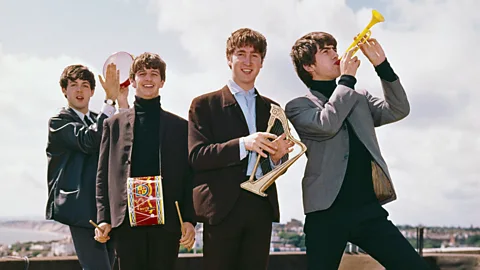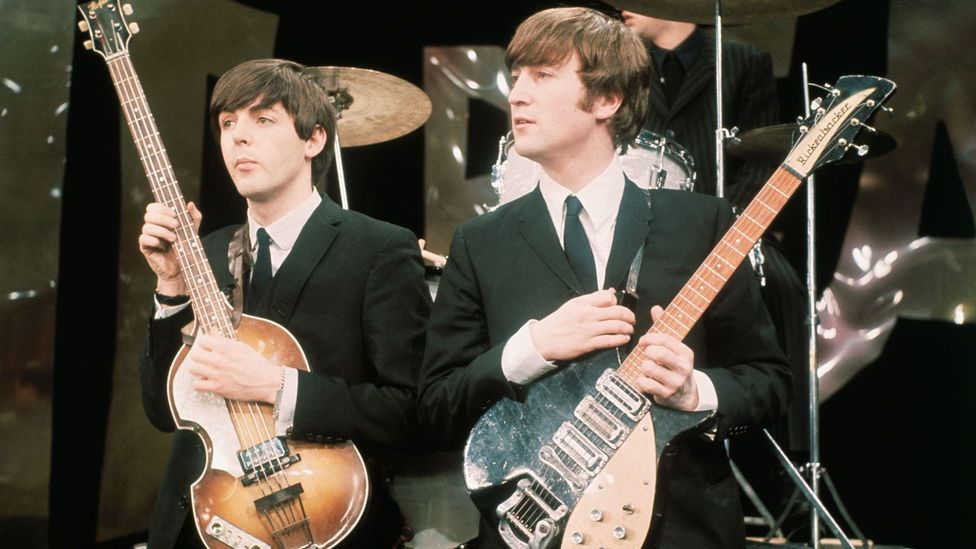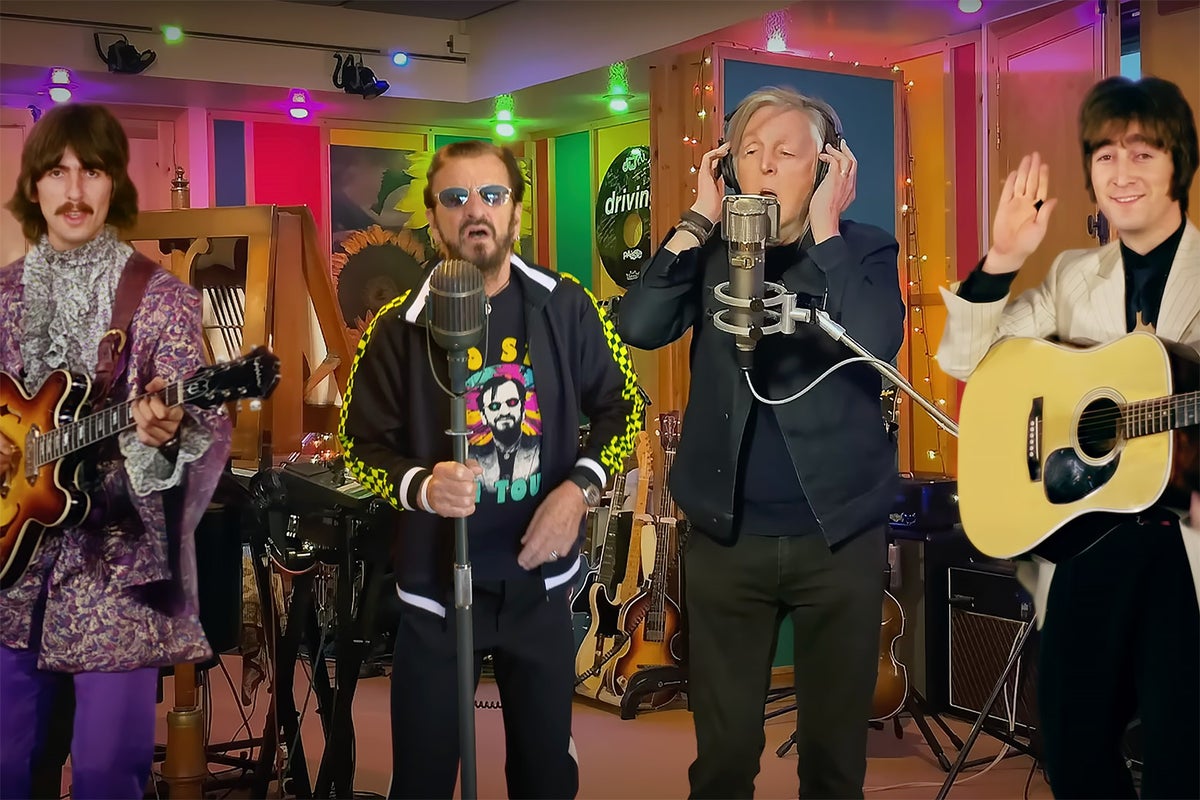With the news of a ‘final’ record from The Beatles, and the development of AI voices, holograms and “raves beyond the grave”, where should we draw the line, asks Arwa Haider.
“I think we’re actually on the cusp of something exhilarating and terrifying… it’s an alien life form.” When Bowie voiced these thoughts in a 1999 interview, he was greeting the creative dawn – or potential cataclysm – of the digital age. His words seem even more spookily resonant several years after his death (the Starman left this world in 2016). The music industry remains in a state of flux, and tech continues to connect realms – and maybe even raise the voices of long-departed singers.

AI music is frequently taken to mean the buzz around “deepfake” digitally-generated vocal sounds, whether imitating the styles of contemporary stars (for instance, the recent AI “fake Drake”/The Weeknd track Heart on my Sleeve uploaded by TikTok user ghostwriter977) or dead legends – including a flurry of AI Bowie “new songs”, covers and imaginary duets (such as Life on Mars featuring a digital Freddie Mercury). At the same time, slightly confusingly, AI music relates to the cutting-edge tech used to restore recordings actually made by a singer in their lifetime – such as the release of The Beatles’ “final song”, Now and Then, with its first bars written by John Lennon in 1978 and the track completed last year.
This isn’t the Fab Four’s only “new” record following their original split, or Lennon’s death in 1980; Free as a Bird (featuring Lennon’s hazy lead vocals) became an international hit in 1995 – but tech capabilities have soared since then, and the Peter Jackson-directed archive doc series Get Back (2021) proved pivotal. McCartney explained in a recent Radio 4 interview that John Lennon’s voice was extracted from “a ropey little bit of cassette” using tech trained to detect individual voices and distinguish them from surrounding audio.
“We had John’s voice and a piano and he [Jackson] could separate them with AI,” said McCartney. “They tell the machine, ‘That’s the voice. This is a guitar. Lose the guitar.’
“So when we came to make what will be the last Beatles’ record, it was a demo that John had [and] we were able to take John’s voice and get it pure through this AI.”

The draw of the familiar
While machine-learning software is rapidly evolving, there are various deep-rooted motivations behind such posthumous expressions. As music fans, we’re usually excited to hear anything featuring our favourite singers; if they’re no longer with us, that sharpens the desire. There’s an emotional hook as well as a novelty factor when Lennon “reunites” with McCartney (including their “virtual duet” at the latter’s Glastonbury set last year), or when multi-genre holograms (Tupac, Maria Callas, Ronnie James Dio) materialise onstage, even with noticeable glitches. Obviously, commercial corporations are also keen to draw as much revenue as possible from artist legacies, and posthumous releases can be lucrative business; alt-rock icon Kurt Cobain was just 27 when he killed himself in 1994, but he continues to generate millions, through releases of extremely variable quality.
A moral dilemma persists in bringing singers back from the dead. Most artists have creative ideals, and we can only guess what they would have wanted once they’ve gone; “deepfake” tracks suggest that singers are infinitely malleable – serving industry whims and viral gimmicks, even as raves beyond the grave. The AI-generated craze hasn’t been limited to dead Western stars; international examples have included “new” tracks from South Korean folk hero Kim Kwang-seok as well as Israeli singer Ofra Haza – but as it stands, most “deepfake” music sounds depressingly bloodless, like a bot version of ’90s TV show Stars in their Eyes.
While nostalgia is a powerful force, there’s also an “ick factor” to the sentimentality of many posthumous projects – perhaps most luridly demonstrated in Barry Manilow’s 2014 album, My Dream Duets, which featured him crooning alongside recordings of dead icons including Judy Garland, and Whitney Houston.
Despite this, some contemporary vocalist/producers have responded positively to “deepfake” tech – notably, electronic artists such as Grimes and Holly Herndon (whose 2021 custom voice instrument Holly+ invited users to upload tracks for reinterpretation). Even the trailblazers admit that they’re feeling their way, though, and global laws remain nebulous around AI and intellectual property.
“As an artist, the AI possibilities of collaborating with vocalists who have passed away evoke a mix of excitement and unease,” admits J Lloyd, co-founder/frontman of Jungle, whose original tracks including latest single Dominoes dig deep into classic soul and funk styles. “When considering how future generations will connect with our own music, AI sparks a sense of curiosity and wonder – will our expressions be experienced in new, immersive ways, or will the human touch and emotional resonance that defines our music be overshadowed by technological advancements?”

Some singers have reacted more emphatically against posthumous projects; in 2021, Anderson .Paak had part of his will tattooed on his arm (“When I’m gone, please don’t release any posthumous albums or songs with my name attached”). Although Amy Winehouse’s estate approved the posthumous collection Lioness – Hidden Treasures (2011), Universal label CEO David Joseph later announced that her vocal demoes had been destroyed as “a moral thing”, to avoid future releases she couldn’t have consented to.
Ultimately, the most sensitively treated posthumous releases tend to be nurtured by those who genuinely knew and loved the artists. The posthumous Sparklehorse album was released in September, with Mark Linkous’s younger brother and sister-in-law completing the work they started before his tragic death in 2010.
The emotional and creative bond to a late singer is also expressed in far-reaching ways; out in July, album The Endless Coloured Ways centres on the songs of Nick Drake (who was just 26 when he died in 1974), with reinterpretations from artists including Emeli Sandé and John Grant. The project was overseen with a distinctly human touch by Cally Calomon (manager of the Nick Drake estate, who has worked closely with Drake’s family since the ’90s), and Jeremy Lascelles, co-founder of Blue Raincoat Music and CEO of Chrysalis.
“All art is artifice… No intelligence is ever ‘artificial’,” Calomon tells BBC Culture. “Calling intelligence, however so generated, ‘artificial’ is yet another example of humankind trying to absolve themselves from the blame and consequences of their invention.”
Lascelles points out: “AI is only the latest in a long run of technological advancements, and as with all things that involve disruptive change, it is both threatening and brings about huge opportunities. Artists and songwriters have forever written songs inspired by their peers – sometimes brilliantly, sometimes in ways that are cringingly and crassly obvious. The same applies to posthumous recordings being brought life by means of modern technology. In the end, the only judges will be the listener. Does this sound emotionally engaging and ‘authentic’, or does it sound fake and contrived?
“With The Endless Coloured Ways we asked a range of artists to re-invent these songs in their own style, requesting only that they don’t copy Nick’s original recordings. We think the results are spectacular. And we can assure you that no modern piece of technology was mistreated or harmed in any way during the process.”
This article was originally published in June 2023.





